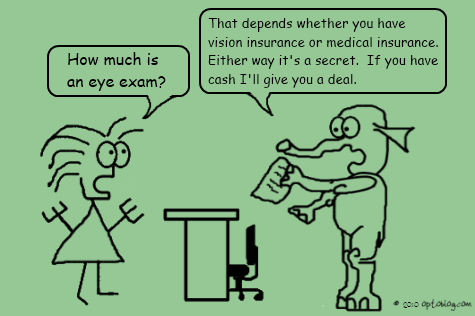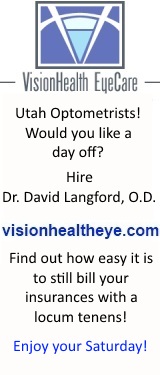
The not so simple question...
There is a not-so-simple question that pretty much every patient asks, “How much is your eye exam.”
While the medical model has varying levels of exam, like Level II-New vs. Level IV-Est, which depend upon the history, exam, and complexity of that particular case; however, there are some among our profession that make it an especially hard question to answer, and this issue raises concern over the ethics of a fairly popular fee structure.
For example: the price in front of the Big Box says “Eye exams starting at $45!”
But are they really? Sure, for a “routine eye exam” where nothing is wrong and you just want your glasses updated, then it’s the $45. But what if I have some allergy eyes, so the doctor gives me a prescription for Pataday as well as my glasses Rx? All the sudden the exam somehow costs $120!?!?
Huh, something funny going on around here. I think big box doctors are more likely to do this since their exam fees are so low, they make up for it by gouging in other fees. I have no problem with a doctor who says their S0620 is $100 and their 92004 is $120. However, I think there is something wrong if the S0620 is $45 and the 92004 is $140.
It’s like some among us in the optometric profession are playing the windshield chip repairman scheme.
But what really happens? Patients won’t typically notice this bait-and-switch. It’s really the insurance companies who get hammered. The patient pays their copay, and if the doctor can come up with any excuse to bill a medical code, they use their medical model fee structure to justify it.
Ethics applies when we realize that, for some reason, private pay patients are rarely charged the same high fees as the insurance companies. Huh. Oh well. It’s a victimless crime because those big, bad insurance companies won’t miss the extra cash. Until we realize that the more insurance companies pay out, the more the patient’s premiums will be raised next year. Whoops. Sorry, Mrs. Smith, that you can’t afford to keep your medical insurance in the future because I wanted to get paid double or triple my usual fee because you have insurance today.
By the way, it cost me about $2000 to bill insurance last year (PIM software license, E-filing charges, and postage/paper for mailing statements/refunds). Also add to that the cost of time spent filing claims and handling overpayment and underpayment. If I didn’t have to deal with insurance, I could drop my exam fee by at least $5 per person.
I have an idea: All patients should pay for office visits out of pocket. If they have insurance, get reimbursed later. The doctor won’t know about their insurance, so there won’t be a conflict of interest about what exam fee structure he’ll choose. The doctor can lower his fees since filing claims is expensive and time consuming. Everyone wins. Another idea, insurances should allow me to charge either them or the patient a $5 claim filing service fee.
Take home point: I don’t believe it is ethical to have one fee structure for insurance patients and another drastically different one for private pay. Yes, I’m all for charging more money if something is more work and more time. That’s why a contact lens evaluation is paid on top of the routine eye exam. That’s why there are different levels of 99*** office visits. But sneaking a huge fee onto an insurance claim just because there is some medical code excuse is something I don’t think our profession should feel comfortable with.
Tags:
Comics,
commercial,
Consultants,
Income,
insurance,
optometrist














